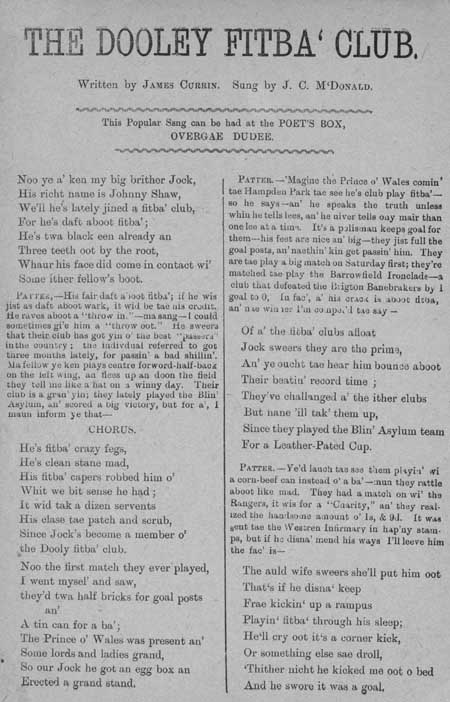
 |
| home | background | illustrations | distribution | highlights | search & browse | resources | contact us |
Broadside ballad entitled 'The Dooley Fitba' Club' |
CommentaryThe first verse begins: 'Noo ye a' ken my big brither Jock, / His richt name is Johnny Shaw, / We'll he's lately jined a fitba' club, / For he's daft aboot fitba'. It was written by James Currin and sung by J.C. McDonald, and could be purchased from the Poet's Box, Overgate, Dundee. The narrator of this comical verse is bewailing his brother's unusual foray into the game of football. His brother, Johnny Shaw, has joined the Dooley Fitba' Club and, despite the club's obvious shortcomings, thinks 'they are the prime'. The reality of course is quite different, and therein lies the humour. The song alternates between lines of verse and comic 'patter' which, if performed well, would have proved extremely funny. Although this song was printed in Dundee it refers to matches in the football-hotbed of Glasgow. It mentions a charity match with Rangers and an encounter between the wonderfully-named Barrowfield Ironclads and Brigton Banebreakers. Unusually, this Dundee Poet's Box publications has a name attached and some context given for its recital - both by the stage directions and the separate singer's name. The author James Currin or Curran, originally from Co. Donegal in Ireland, was a well-known Glasgow songwriter and parodist whose works were popular in the music halls of the time. This song is probably the basis for the 'Fitba' crazy' song made famous by Jimmie MacGregor and Robin Hall in the 1960s. A version was also included by Ewan MacColl in 'Scotland sings', a collection published in 1953. MacColl heard the song from his father William Miller. It is not clear what the connection between the different Poet?s Boxes were. They almost certainly sold each other?s sheets. It is known that John Sanderson in Edinburgh often wrote to the Leitches in Glasgow for songs and that later his brother Charles obtained copies of songs from the Dundee Poet?s Box. There was also a Poet?s Box in Belfast from 1846 to 1856 at the address of the printer James Moore, and one at Paisley in the early 1850s, owned by William Anderson. Early ballads were dramatic or humorous narrative songs derived from folk culture that predated printing. Originally perpetuated by word of mouth, many ballads survive because they were recorded on broadsides. Musical notation was rarely printed, as tunes were usually established favourites. The term 'ballad' eventually applied more broadly to any kind of topical or popular verse.
|
Probable period of publication:
1880-1900 shelfmark: RB.m.143(050)

|